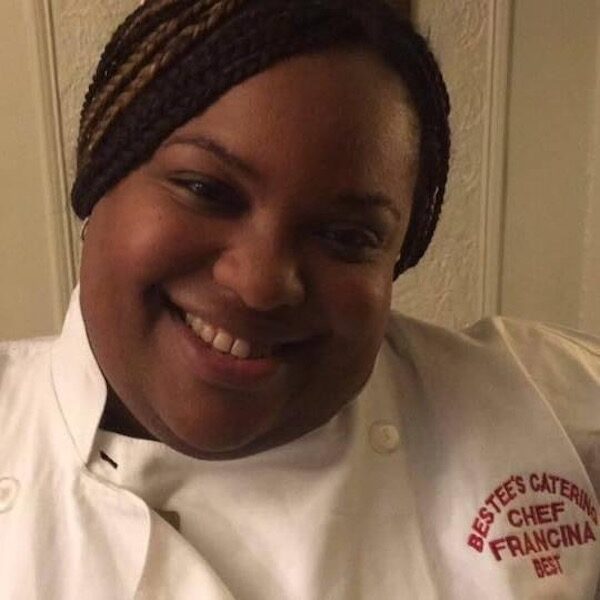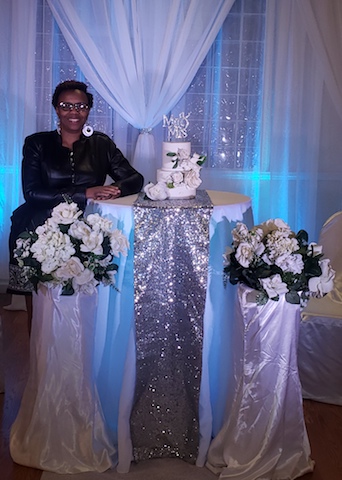New York, NY – Covid-19 touched down in the United States over a year ago, and has had a profound effect on small businesses. Latasha Smith and Francina Best are both owners of catering business that were once side hustles to their day-to-day jobs. But the pandemic has left one of the entrepreneurs struggling, while the other has managed to flourish.
Smith was a corporate human resources manager for nearly two decades, but after a disappointing experience with the catering hall that she had for her wedding, she realized that she could take an otherwise bad moment and turn it to a profitable business.
“People of color were not valued at catering halls at that time,” Smith says. “Around that time, they didn’t order a lot of Black food and people wanted Afro-centric weddings.”
Smith saw the gap in the wedding market and started a sole proprietorship for wedding and event planning the following year for her sister’s wedding.
“I learned from my own wedding how to make those types of events better,” says Smith. “I would start making flower arrangements, and say, ‘don’t get that vendor, get this vendor’. Then I started making relationships with vendors that were dependable.”
Corporate downsizing eliminated Smith’s position at her former job in 1999, and in 2001 she used her severance package to open Occasions Banquet and Catering Hall in Springfield Gardens, Queens.
“This was an abandon warehouse that was fully renovated,” says Smith.
Best’s journey to opening a catering business was very different from Smith’s.
“I’m an after school educator, but I like to cook as well,” says Best. “I was cooking for the kids and I made something for someone, and they asked me, can you make this for me privately. I said, sure.”
That was five years ago, and led Best to create Bestee’s Catering from her home in Queens as a part-time business.
“When I was 14 or 15, I would help out at the church kitchen,” says Best. “So it was interesting how this business all started.”
Best’s route to catering probably wouldn’t have never occurred if she didn’t grown frustrated with New York’s education system.
“I have my own after school program, it is called Bestee’s Wisdom Corner,” Best says. “I originally started that after I quit as an after school kindergarten teacher because they were not teaching kids the necessities, they were teaching them to pass a test.”
Best left her kindergarten job in 2013, and started her own affordable after school program in Cambria Heights, Queens charing parents $210 a month, instead of the typical $800 a month.

Despite her passion for education, Best closed her after school program on March 14, 2020, to keep her staff safe from Covid-19. That, however, left her with more time to cook.
“People started asking, do you do single meals?” says Best, who initially rejected the idea. “Then I started Monday’s with Fran and started giving out plates on that day.”
Regular wholesale catering orders soon followed. Best decided to go full-time with the catering business last April, after receiving so many orders for Easter.
“I’ve been cooking more than ever,” says Best.
Even though Best does have an extra fridge at her home, and a commercial kitchen for catering meal orders, she can no longer sustain a catering business from her home and plans on transitioning into a restaurateur later this summer.
“My house is getting too small,” says Best. “Not only are more people ordering food, but because of Covid-19, I have to pack the food in individual containers. I have a refrigerator, but I also need table space and I want to accommodate my community. I have elderly people that order food on those Monday’s and I want to provide for that on a regular basis.”
Best also plans on reopening her after school program for summer and rehire her eight employees, then open up again for the fall semester to get all of her 60 kids back on track.
Smith’s road to recovery remains fraught and uncertain.
“Initially, you are hearing the news and they make it sound like the sky is falling, but I wasn’t paying attention,” says Smith. “It really didn’t hit home until people started flying out [of stores] with toilet paper. It was later, [in] February, when I started paying attention to what was going on.”
At worst, Smith thought Covid-19 would be like the Ebola outbreak, which resulted in 11 cases and two deaths in the U.S.
“It was the end of March, that we shuttered down through April,” says Smith. “It was the beginning of our heavier season. I thought we would be back open in May.”
May came and went, and not only did businesses not open back up, Smith had to refund 40 customers and reschedule 20 others who wanted to use her catering hall for festivities.

“It was still closed in May. It was still closed in June,” says Smith, who has lost hundreds of thousands of dollars. “We lost a lot, but the real problem was that the government was helping restaurants, and no one was helping people with venues.”
Smith’s business was closed during the height of the pandemic, but Covid-19 didn’t stop her landlords from charging rent, or electric companies for charging monthly bills.
Smith had to create mini-dining experiences for clients who still wanted to support her business.
“They thought it was nice,” says Smith. “We did that, and those who refused to cancel, we U-Hauled our stuff and brought it to Roy Wilkins Park for weddings and events. We didn’t lose the full amount, but we had to pay fees to the park.”
Smith has depleted her personal savings, PPP loans and EIDL loans to keep her business afloat.
Smith was allowed to open her business up in October, only to have to shut down again in December. She has since reopened as of Valentine’s Day and continues following the same Covid-19 guidelines for restaurants since there are none for event spaces.
“We are just getting back to people booking us for March,” says Smith.
Smith is in the process of applying for grants and believes her business will back to where it was by next year. Despite her own struggles, she believes vendors might have it worse.
“The lack of help for venues or event spaces has a trickle down effect; the vendors are suffering, too,” says Smith. “The linen place has gone out of business. So, if we are out of business, they have no one to rent their wholesale specialty items to. My cake people have gone out of business. It’s a whole domino of closing businesses. There are a lot of quiet businesses that don’t get attention.”

